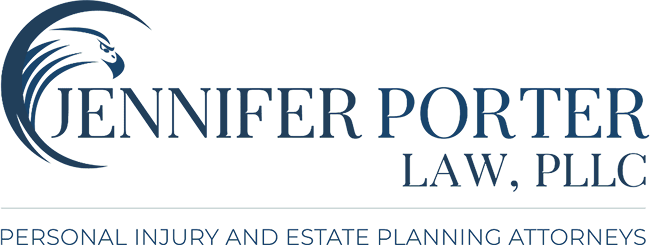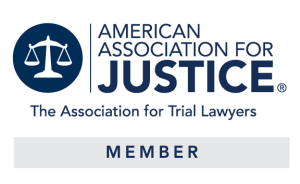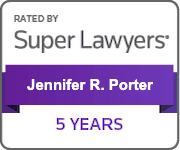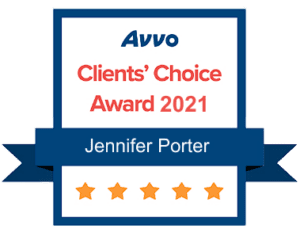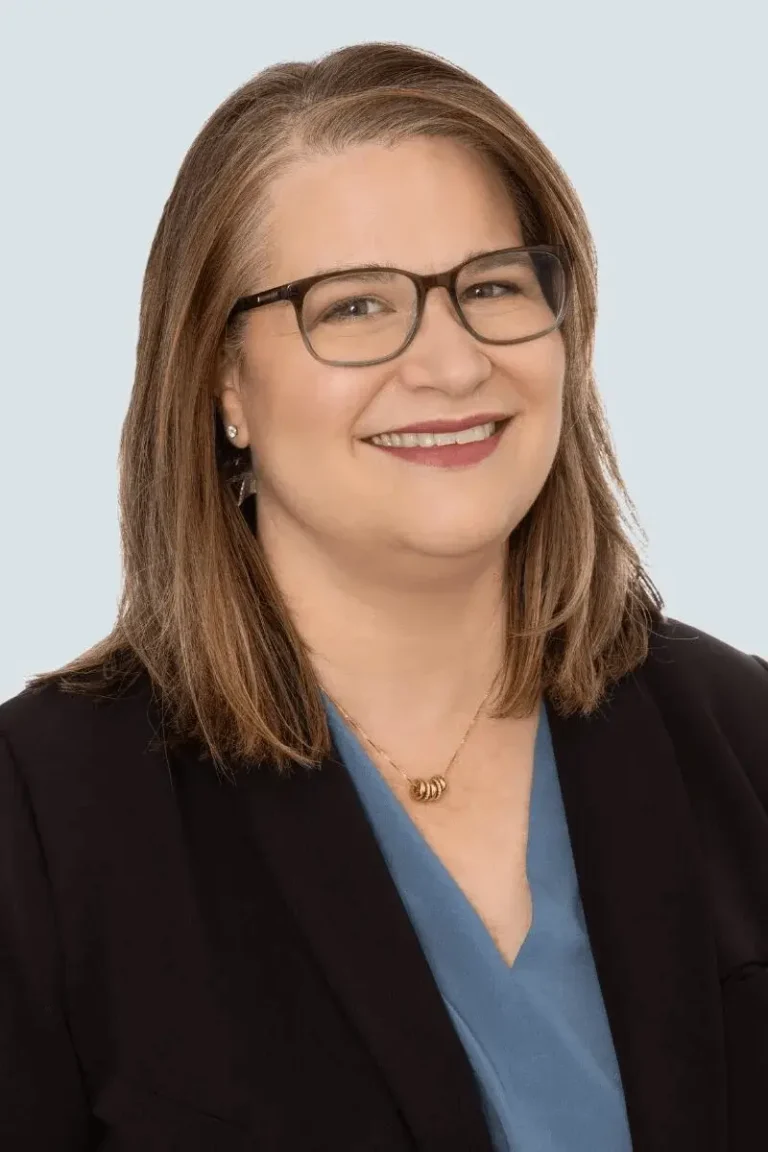We take the time to truly listen and understand your needs.
Personal Injury and Estate Planning Attorneys
Protected.
For a Free Consultation, 24 hours a day, 7 days a week
Attention to detail that larger firms often overlook.
A focus on quality, not quantity.
$950,000
Pedestrian
Pedestrian in crosswalk struck by hit-and-run driver in City of Fairfax, VA; catastrophic injuries
$300,000
Motorcycle
Maximum Possible Under Policy. Motorcycle crash caused by driver who violated the right of way in Springfield, VA
$60,000
Motorcycle Accident
Motorcycle accident on a highway in Falls Church, VA. Soft tissue injuries; resolved through liability and underinsured motorist coverage.
The aftermath of serious injury caused by someone’s negligent actions can make a significant impact on your life. You may be unsure of what to do and how to get the compensation you need during a difficult time. Insurance companies are always focused on protecting their bottom line, which means you need an advocate looking out for your best interests from day one of your claim.
A Springfield personal injury lawyer could manage all aspects of your legal matter to give you the best chance at maximizing your potential compensation and allowing you to focus on your recovery. From gathering evidence and filing paperwork to investigating the accident and consulting with expert witnesses, at Jennifer Porter Law, PLLC, we work hard to help you move forward.
Former Insurance Defense Attorney on Your Side: A Legal Edge
Jennifer’s background as a former insurance defense attorney, where she spent over eight years representing insurance companies in personal injury claims, gives her insider knowledge of how adjusters approach and evaluate claims. This experience helps Jennifer anticipate the strategies used by insurance companies, providing her clients with a significant advantage in negotiations and legal proceedings. Combined with the firm’s deep understanding of personal injury law, Jennifer’s insights ensure every client receives a well-rounded, strategic approach to their case.
At Jennifer Porter Law, we believe in taking proactive steps today to ensure peace of mind for tomorrow. Our Springfield personal injury attorneys are dedicated to guiding you through life’s most difficult decisions with care and a personalized approach.
To have Jennifer Porter as my lawyer for what was one of the most traumatic experiences of my life was a GodSend❤️. She was informative- looked out for my best interest first and foremost and kept me in the loop every... Read Full Google Review

Over 25 years of Experience Focused on Your Success
With over 25 years of experience, Jennifer offers deep insights to help clients navigate the complexities of their cases. This experience allows her to provide clear guidance and prepare clients for each step, helping them make informed decisions about their legal needs.
Many people believe hiring an attorney is only necessary if they plan to file a lawsuit. In reality, contacting a personal injury attorney right after a Springfield accident is key to protecting your rights and securing the best outcome. Early involvement shields clients from manipulative insurance adjusters and ensures they’re in the strongest possible position.
Comprehensive Estate Planning with a Personal Touch
The team at Jennifer Porter Law brings decades of combined legal experience and helps clients navigate Virginia’s estate laws with clarity and confidence. Their deep knowledge and genuine care for clients’ needs allow them to simplify complex decisions and ensure that every client’s assets and wishes are protected. With their guidance, families gain peace of mind knowing their loved ones and legacies are secure.
I worked with Jennifer & her team for initial consultation on estate planning. There were personal factors beyond Jennifer’s control that prevented us from proceeding, but I found the entire experience very smooth and easy… Read Full Google Review

Direct Access to Your Attorneys
Unlike larger firms, where clients often deal with layers of staff, at Jennifer Porter Law, you’ll have direct access to Jennifer, Stephanie, and Michelle. This hands-on approach ensures your questions are answered promptly and your concerns are addressed personally. Our Springfield personal injury and estate planning attorneys will guide you through difficult decisions with care, offering empathy-driven support and personalized attention every step of the way.
Legal Support for Military Families
As military spouses, Jennifer and Stephanie understand the unique challenges faced by military families. From frequent relocations to navigating military medical systems, Tricare/Humana benefits, and legal protections, our firm offers comprehensive legal support tailored to your needs. Whether for estate planning or personal injury matters, our team of attorneys in Springfield is dedicated to providing the personalized attention and strategic solutions that military families deserve.
A Female-Led Firm with a Unique Perspective
Jennifer, Stephanie, and Michelle bring a unique perspective to legal representation, combining strength, empathy, and a collaborative approach. Our Springfield personal injury and estate planning attorneys take pride in building strong client relationships, ensuring that every individual feels heard and supported. Our attention to detail and focus on open communication are what set us apart and enable us to deliver tailored legal solutions that larger firms often overlook.

Learn More
Personal injury law in Virginia covers a wide range of incidents, from auto accidents to slip-and-fall cases, where someone’s injury results from another’s negligence. Virginia operates under a “contributory negligence” rule, which means that if an injured party is found even slightly at fault for the accident, they may be barred from receiving compensation. This stringent standard makes understanding and adhering to state laws crucial for those seeking justice.
The contributory negligence rule demands that individuals involved in personal injury cases be proactive and cautious in both their actions and their legal strategies. Understanding this doctrine and effectively planning around it are vital for anyone seeking compensation for injuries sustained due to someone else’s actions. The challenges posed by this rule make it essential to have competent legal representation to effectively face the personal injury law landscape.
Given the state’s strict contributory negligence laws, securing legal representation is critical. A lawyer well-versed in Springfield’s personal injury laws can offer significant guidance, helping to navigate the legal requirements and advocate for the client’s rights. Legal professionals are instrumental in assembling the necessary documentation, representing the client’s interests in settlement negotiations, and providing counsel throughout the legal process.
When facing the aftermath of a motor vehicle accident, selecting the right legal representation is crucial to protect your rights and receive the compensation you deserve.
Jennifer Porter brings a unique perspective to her practice. Having served as house counsel for Progressive Insurance and as hired counsel for several major insurance carriers, her unique experience has given her a deep understanding of how insurance companies operate, which is invaluable when tackling insurance claims. Her insider knowledge allows her to anticipate the tactics that insurance companies may use to minimize payouts, ensuring she can counteract these strategies effectively.
With over 24 years of experience in personal injury law, Jennifer has a well-established track record of providing excellent legal representation. Her experience spans hundreds of cases, from motor vehicle accidents to pedestrian accidents, equipping her with the knowledge and skills necessary to handle a wide range of claims. This extensive experience not only enhances her ability to manage complex legal issues but also provides her with a comprehensive understanding of the nuances of personal injury law in Virginia.
Focused on Client Recovery
At Jennifer Porter Law, PLLC, our focus is not just on winning cases, but also on your overall recovery. Understanding that accidents can be traumatic experiences, our attorneys can help ensure that each client receives both professional legal assistance and the support needed to focus on physical and emotional recovery. This holistic approach to personal injury law underscores our commitment to clients’ well-being beyond the courtroom.
Personalized Legal Strategy
At Jennifer Porter Law, PLLC, we pride ourselves on crafting personalized legal strategies tailored to the specific circumstances and needs of each client. Unlike larger firms where clients may feel like just another case number, Jennifer Porter Law, PLLC provides a more personalized and attentive service. Each client is treated with the utmost importance and strategies are developed in close consultation with the client, ensuring that their specific legal goals are met.
Choosing Jennifer Porter Law, PLLC means opting for a law firm that combines deep industry knowledge, extensive legal experience, a client-focused approach, and a personalized legal strategy. If you are involved in a personal injury case in Springfield, Jennifer Porter Law, PLLC offers more than legal representation—we provide a partnership focused on securing the best possible outcome for your recovery and well-being.
Contact us today at (571) 532-9070 to schedule a consultation.
Springfield operates under an “at-fault” insurance system, meaning the driver responsible for causing an accident is financially liable for the resulting damages, including physical injuries and property damage.
Under this system, injured parties have several options for seeking compensation. They can:
- File a claim with their own insurance company, which will then seek reimbursement from the at-fault driver’s insurer (a process called subrogation). This method is commonly used for property damage claims and uninsured motorist claims.
- File a claim directly against the at-fault driver’s insurance. This method is commonly used for personal injury claims.
- File a lawsuit to pursue damages. This method is used when settlement negotiations fail.
The at-fault system places the financial burden on the responsible party, emphasizing the importance of accurately determining liability and can influence how insurance premiums are calculated, with at-fault drivers potentially facing higher premiums due to the increased risk they pose.
Virginia is one of the few states that still adhere to the pure contributory negligence rule. In Virginia, if a plaintiff is even 1% at fault for the incident leading to their injuries, they cannot win any compensation from the defendant, no matter how negligent the defendant was. This can apply in various scenarios, such as car accidents, slip and fall cases, and other types of personal injury situations.
To illustrate, consider a pedestrian accident where a person jaywalks and is hit by a speeding car. Even though the driver was speeding, if the pedestrian’s jaywalking is considered a contributing factor to the accident, then under the contributory negligence rule, the pedestrian would be unable to recover damages from the driver.
This is a strict stance compared to the more forgiving comparative negligence rule used in other states, where damages can be reduced based on the plaintiff’s percentage of fault rather than completely denying recovery.
Thus, plaintiffs must be extremely cautious and thorough in documenting their actions and the circumstances surrounding their injury. Any evidence of their liability, no matter how minor, can completely preclude them from receiving compensation. This often results in plaintiffs needing rigorous legal representation to prove absolute non-fault.
Implications for Personal Injury Plaintiffs
The doctrine of contributory negligence makes it imperative for personal injury plaintiffs in Springfield to be able to prove they were in no way responsible for the accident. This often necessitates a thorough legal examination and presentation of evidence to clearly establish the defendant’s sole responsibility. Plaintiffs must be meticulous in documenting their actions and gathering proof to support their claim of no liability on their part.
Given the stringent nature of contributory negligence in this area, individuals involved in personal injury cases benefit greatly from seeking legal counsel. At Jennifer Porter Law, PLLC, our Springfield personal injury attorneys may be able to provide indispensable guidance in tackling these cases, helping to ensure that all aspects of the incident are properly documented and presented in court to counteract any claims of contributory negligence.
Contact us today at (571) 532-9070 to schedule a consultation.
Rear-end collisions are among the most common types of vehicle accidents in Springfield, accounting for roughly one-third of all vehicle collisions. These accidents occur when one vehicle strikes the back of another and can result from various factors:
- Distracted Driving: Engaging in activities that take the driver’s attention away from the road.
- Speeding: Failing to have enough time to react to traffic changes because of high speed.
- Heavy Traffic: Frequent stop-and-go traffic increases the likelihood of rear-end collisions.
- Sudden Stops: Abrupt stopping can catch following drivers off-guard, especially if they are distracted or following too closely.
- Weather Conditions: Rain, snow, and icy conditions can reduce tire traction and increase stopping distances, leading to collisions.
Establishing Fault
In Springfield, proving fault in rear-end collisions typically hinges on demonstrating that the rear driver violated traffic laws or safe driving practices, leading directly to the collision. Here’s a streamlined approach:
Presumption of Fault
In Virginia, there is a presumption that the rear driver in a rear-end collision is at fault, primarily under the assumption that they were following too closely (tailgating), failed to maintain an adequate stopping distance, and failed to pay full time and attention.
Gathering Evidence
- Driver Admissions: Statements made by the drivers at the scene can be crucial. If the rear driver admits to being distracted or acknowledges they were too close, this can strengthen the claim that they are liable.
- Traffic Citations: If the rear driver was cited by police at the accident scene for a traffic violation related to the collision, this can be compelling to assist the insurance company with conceding liability.
- Vehicle Damage: The pattern and extent of vehicle damage can indicate how the collision occurred, strengthening the case against the rear driver.
- Independent Witnesses: Testimonies from bystanders or other drivers who witnessed the accident can provide unbiased accounts of how the collision occurred.
Refuting Exceptions
- Sudden Stops: The rear driver might argue that the front driver stopped suddenly, making the crash unavoidable. Dashcam footage or witness statements can counter this claim, especially if the front driver had a valid reason (e.g., traffic congestion or a red light).
- Mechanical Failures: If the rear driver cites a vehicle malfunction (like brake failure), maintenance records or expert inspection can confirm or debunk this defense.
If you or a loved one has been involved in a rear-end collision in Springfield, it is crucial to seek legal representation as soon as possible. A skilled personal injury lawyer from Jennifer Porter Law, PLLC, can provide experienced advice and representation, ensuring that your rights are protected and you receive the compensation you deserve for your injuries and losses. Our track record with similar cases and deep understanding of local laws will be invaluable in helping you through this challenging time.
Call us today to schedule a consultation at (571) 532-9070.
Immediately after a car accident, safety is the priority. Check for injuries and call emergency services. It is also important to document the scene by taking photographs and gathering information from witnesses. Contacting the police to file a report is essential, as it formally logs the incident and provides a factual basis for insurance claims and legal actions. Victims should also notify their insurance company as soon as possible to start the claims process.
Handling Insurance Claims After a Car Accident
Dealing with insurance claims can be daunting. Virginia’s fault-based insurance system requires proving that another party was at fault and liable to claim damages from their insurer. It’s advisable to review the terms of your insurance policy to understand coverage limits and exclusions. Communicating effectively with insurance adjusters, keeping detailed
records of all correspondence, and being cautious about signing any settlements without legal advice are key steps in this process.
Seeking Compensation for Car Accident Injuries
In Virginia, victims of car accidents can seek compensation for medical expenses, lost wages, and pain and suffering. The process involves compiling medical records, employment documents, and other evidence to prove claims for economic and non-economic damages. Legal representation can be invaluable here as a lawyer can help accurately assess the total impact of the injury and negotiate effectively with insurance companies to seek appropriate compensation.
Contact Jennifer Porter Law, PLLC today at (571) 532-9070 for skilled legal assistance.
In Virginia, pedestrian accidents are a serious matter given the significant risks involved when pedestrians are struck by motor vehicles. Understanding the common causes of these accidents, recognizing the legal rights of injured pedestrians, and knowing the critical steps to take immediately after an accident can empower victims to protect their health and legal interests effectively.
Common Causes of Pedestrian Accidents
Pedestrian accidents inSpringfield often occur due to driver negligence, including speeding, failing to yield at crosswalks, or distracted driving. Environmental factors such as poor lighting or obstructed pathways also contribute to these accidents. Understanding these common causes can help in identifying liable parties and build a strong legal claim.
Legal Rights of Injured Pedestrians
Virginia’s laws offer protections to pedestrians injured due to the negligence of drivers. Injured individuals have the right to seek compensation for their injuries, but they must adhere to Virginia’s contributory negligence rule, which completely bars recovery if the pedestrian is found even minimally at fault. Knowledge of these rights is crucial when pursuing a claim to ensure that justice is served.
Steps to Take Following a Pedestrian Accident
The actions taken immediately after a pedestrian accident are critical for any legal claim’s success. The injured party or witnesses should promptly contact emergency services, document the scene by collecting witness information, taking photos, and reporting the accident to the police for an official record. Consulting a skilled Springfield personal injury attorney can be invaluable in managing the accident’s aftermath.
Contact Jennifer Porter Law, PLLC today at (571) 532-9070 for a consultation.
Virginia’s roads host a growing number of bicyclists each year, which increases the potential for bicycle-related accidents. Bicyclists are granted the same rights and are subject to the same duties and responsibilities as motor vehicle drivers.
This includes obeying all traffic signals and signage, riding with the flow of traffic, and using designated bicycle lanes when available. Bicyclists also have specific responsibilities such as equipping their bikes with the required lights and reflectors for night riding. Understanding these rules is crucial for both safety and legal reasons, especially when accidents occur.
Common Injuries Sustained in Bicycle Accidents
Bicycle accidents can lead to severe injuries due to the limited protection that bicycles offer compared to motor vehicles. Common injuries include fractures, head and brain injuries, spinal injuries, and road rash. These injuries can result in significant medical expenses, prolonged recovery periods, and other long-term effects that impact a cyclist’s quality of life and financial stability.
How to Claim Compensation After a Bicycle Accident
After a bicycle accident in Springfield, it is crucial to document the scene, seek immediate medical attention to record injuries, and report the incident to the police for an official report—steps that are vital for supporting any compensation claims. Collecting witness and involved driver contact information is also important.
Consulting with an experienced personal injury lawyer from Jennifer Porter Law, PLLC who is well-versed in Springfield’s personal injury laws can significantly enhance the process. We can assist in negotiating with insurance companies and, if necessary, pursue a lawsuit to secure compensation for medical expenses, lost wages, pain and suffering, and other provable damages. Contact us today to schedule a consultation.
Motorcyclists in Virginia encounter numerous risks that are less common for other vehicle drivers. The lack of physical barriers between a motorcycle and the road or other vehicles leads to a higher likelihood of severe injury or fatality in accidents. Motorcyclists are also
more vulnerable to road hazards such as potholes, wet pavement, and debris. Furthermore, motorcycles are less visible to other drivers, especially at intersections or in poor lighting conditions, increasing the risk of collisions.
Statute of Limitations for Motorcycle Accident Claims
Victims of motorcycle accidents must adhere to a strict two-year statute of limitations for filing a personal injury lawsuit. If a lawsuit is not filed by the two-year anniversary of the underlying collision, the right to pursue a personal injury claim is typically lost. Awareness of this timeline is crucial for legal recourse. Consulting with a law firm like Jennifer Porter Law, PLLC can provide significant assistance throughout the claim process.
Our team of skilled personal injury lawyers has detailed knowledge of Springfield’s legal system, adeptly handling claims, negotiating with insurance companies, and pursuing litigation if necessary to recover damages for medical costs, lost wages, and pain and suffering. To learn more about how we can assist you, contact us today for a consultation.
For personal injury plaintiffs in Springfield, understanding and implementing effective legal strategies is crucial for securing just compensation. These strategies are designed to maximize the potential for a favorable outcome under Virginia’s personal injury laws.
Investigating a Traffic Accident
A thorough investigation is the cornerstone of building a strong legal case following an injury claim. This process includes gathering all pertinent details from the accident scene, such as photographs, video footage, and eyewitness accounts. It also involves obtaining a copy of the police report, which provides an official record of the incident. Detailed documentation of the accident scene and circumstances can help clarify liability and the sequence of events leading to the accident.
Practical Tips for Plaintiffs
To mitigate the risk of being found contributorily negligent, plaintiffs should consider the following:
- Be Cautious in Statements: After an auto accident, individuals should be careful about what they say to insurance adjusters, the other party involved, or even to friends and family and on social media, as these statements can be used to imply liability.
- Follow Safety Rules and Regulations: Adhering to relevant safety laws and guidelines is crucial. For instance, in slip and fall cases, sticking to designated walkways and paying attention to warning signs can help avoid contributory fault.
- Seek Immediate Legal Advice: Consulting with an attorney before making any decisions or statements related to the accident can provide crucial guidance and protect against self-incrimination.
Using Evidence to Support Your Claim
The success of a personal injury claim in Springfield hinges on the quality and relevance of the evidence provided, such as detailed medical records, expert testimonies on the victim’s injuries and prognosis, and physical evidence from the crash site. This evidence is crucial for demonstrating the severity of injuries, their effect on the victim’s life, and establishing the liability of the other party.
Effective presentation of this evidence and the creation of a legal strategy can profoundly affect the outcome of a claim. At Jennifer Porter Law, PLLC, our team possesses a thorough understanding of what evidence will carry weight and how to present it compellingly in negotiations or court proceedings.
Schedule a consultation today at (571) 532-9070 to speak with one of our top-rated Springfield personal injury attorneys.
In Virginia, accident victims are entitled to seek compensation for losses stemming from injuries provided that their claim survives the harshness of Virginia’s contributory negligence laws. This compensation is crucial in addressing both immediate and extended needs that arise due to the accident. Understanding the types of damages available, how compensation for injuries is calculated, and recognizing the long-term financial impacts of such incidents is essential for effectively pursuing a personal injury claim.
Types of Damages Available to Accident Victims
Virginia personal injury law allows victims to claim a variety of damages, reflecting the multifaceted impact of injuries. Here’s a closer look at each category to understand what they encompass and their significance in personal injury claims:
- Incurred Medical Expenses: These cover all medical costs incurred from the date of the accident until the settlement or judgment. It includes hospital bills, medication costs, expenses for medical procedures, and any other health-related expenses that have already been paid or are still due.
- Future Medical Expenses: This category anticipates the cost of medical care that will be necessary after the judgment is passed and into the future. It includes ongoing treatments, rehabilitation costs, future surgeries, and any long-term care needs, calculated based on current and projected medical pricing.
- Pain and Suffering: Compensation for pain and suffering covers the physical pain and emotional distress suffered due to the accident. This is subjective and varies significantly based on the severity of the injuries, the pain endured, and the overall impact on the victim’s quality of life.
- Disfigurement and Associated Humiliation or Embarrassment: Compensation in this category addresses physical changes such as scars, loss of limbs, or other visible marks resulting from the accident, along with the emotional impact of living with these changes, including public embarrassment and psychological trauma.
- Lost Wages: This includes compensation for the income lost due to the victim’s inability to work during their recovery. It is calculated based on the victim’s earnings at the time of the accident and the time taken off work.
- Loss of Future Earning Capacity: Different from lost wages, this damage compensates for the anticipated loss in earning potential due to long-term effects of the injuries, which might prevent the victim from returning to their former employment or from working altogether.
- Property Damages: This compensates for any physical damage to the victim’s property as a result of the accident, such as vehicle repairs or replacement, and damage to personal belongings.
Understanding these categories is crucial for plaintiffs to ensure all relevant damages are accounted for and appropriately valued in a personal injury case. Accurate documentation and expert testimony often play key roles in quantifying these damages, especially in complex cases involving long-term care or significant non-economic losses.
Virginia’s Contributory Negligence Rule in Common Carriers
Virginia’s approach to personal injury law is notably stringent due to its adherence to the contributory negligence rule. However, this rule has an exception when it comes to injuries sustained while using common carriers, such as buses.
In instances where an individual is injured while being a passenger on a bus or similar transport, the doctrine of contributory negligence may not apply if it can be demonstrated that the carrier violated specific safety regulations. This is a critical exception because it acknowledges that the operators of such services have a heightened responsibility to ensure passenger safety.
If you are injured under these circumstances, you may be able to pursue a negligence claim against both the carrier and the individual operator, such as the bus driver. This can include seeking compensation for a variety of damages such as medical costs, lost earnings due to inability to work, and compensation for pain and suffering. It’s important to clearly document all aspects of the incident and the losses incurred. This documentation can support your claim that the common carrier failed in its duty to provide safe transport, particularly if the injury resulted from a direct violation of safety standards.
Long-Term Financial Impact of Accidents
Accidents can create significant long-term financial burdens on victims, such as ongoing medical care, rehabilitation costs, and potential future lost earnings or earnings capacity if the victim is unable to resume their previous employment. There may also be a need for
modifications to living arrangements, such as accessibility enhancements to homes. When seeking compensation, it is crucial to accurately project these future costs and include them in the settlement negotiations to ensure comprehensive coverage of all potential financial impacts.
Mrs. Porter was amazing! I have never had an attorney or been involved in any legal cases prior to this experience, and she made this experience extremely smooth, simple and effective. Her and her team are extremely p… Read Full Google Review

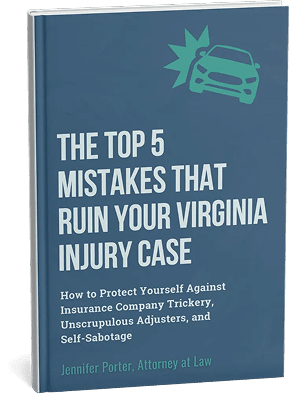
The Top 5 Mistakes That Ruin Your Virginia Injury Case
The Top 5 Mistakes That Ruin Your Virginia Injury Case
HOW TO PROTECT YOURSELF AGAINST INSURANCE COMPANY TRICKERY, UNSCRUPULOUS ADJUSTERS, AND SELF-SABOTAGE
Fill out the form below to download our FREE guide.
Get Experienced and Quality Representation
From a Springfield Injury Attorney
Tackling Virginia’s personal injury laws can be daunting, especially in the wake of an accident. Consult a knowledgeable Springfield personal injury lawyer who can effectively advocate for your rights and secure the compensation you deserve.
Insurance companies frequently aim to reduce or deny claims, which can significantly impact your ability to recover financially and physically from an accident. At Jennifer Porter Law, PLLC, our deep understanding of Virginia’s personal injury laws equips us to effectively advocate on your behalf. We focus on pursuing the necessary compensation that supports your recovery and helps you move forward with your life.
Contact us today at (571) 532-9070 to explore how we can support you through this challenging time and help you move forward with confidence and peace of mind.
Schedule a Free Consultation
Let’s face it together – one conversation at a time.

